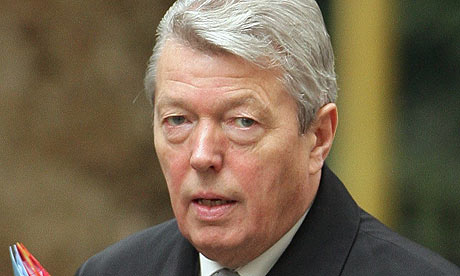
UK terror threat raised to 'severe'
Jenny Percival and Vikram Dodd - The Guardian UI
Jan. 23, 2010
he threat of international terrorism to the UK was raised from substantial to the second highest level of severe last night, meaning an attack is "highly likely".
Alan Johnson, the home secretary, said there was no intelligence to suggest an attack was imminent.
The escalation reversed a decision in July to downgrade the likelihood of a terror attack from "severe" to "substantial".

Alan Johnson, the home secretary, has urged the public to remain vigilant. Photograph: Dan Kitwood/Getty Images
Johnson said the change was not specifically linked to the increased threat from international terrorism following the failed Detroit plane bombing on Christmas Day or to any other incident.
He said the Joint Terrorism Analysis Centre (Jtac), a unit within MI5, had taken the decision based on a broad range of factors, including the intent and capabilities of international terrorist groups in the UK and overseas.
Johnson said: "We still face a real and serious threat to the UK from international terrorism, so I would urge the public to remain vigilant and carry on reporting suspicious events to the appropriate authorities, and to support the police and security services in their continuing efforts to discover, track and disrupt terrorist activity."
He said the public should be reassured by the UK's "very adept and very focused counter-terrorism" services.
The terrorist threat has been at substantial, meaning an attack is a "strong possibility", since July.
There are five levels of terror threat, ranging from low – meaning an attack is unlikely – to critical, when an attack is expected imminently.
More security measures have been taken to protect airports since the failed Detroit attack. On Wednesday, Gordon Brown announced fresh measures to track terror suspects and improve airport security, including a suspension of direct flights between Yemen and the UK and a "no-fly list" to stop suspected terrorists from travelling to the UK.
A senior Whitehall security source said Jtac had assessed events, including the Christmas Day bombing attempt and an international counter-terrorism meeting on Yemen in London on Thursday, which will be held alongside a conference on the future of Afghanistan.
The source added other factors which could not be discussed were also part of Jtac's decision.
Security officials have no knowledge of a direct plot threat. The senior source said: "It is not based on a single piece of evidence or event. There is no knowledge of a new plot or an old plot moving on." Officials do not believe there will be a need to make arrests in the next 24 hours.
The source added that a whole series of events and pieces of intelligence stretching across continents had led to the decision: "Yemen is a part of it, events in London are a part of it. There is no specific threat to London."
Sources with knowledge of the discussions before the decision said the mood among security officials was sober and they had not been as worried as they had been during recent terrorist crises, such as the disrupted 2006 plot to smuggle liquid bombs aboard planes.
Johnson briefed Janet Napolitano, the US homeland security secretary, about the development, which brings the UK on to a similar level of alert to the US.
Terrorism expert Professor Paul Wilkinson, of the University of St Andrews, said raising the terror threat level was mainly designed to increase the vigilance of the emergency services and those working in security jobs. "I think it's not something that the public will notice very much, in terms of everyday life," he said.
www.guardian.co.uk/politics/2010/jan/22/terror-threat-raised-uk-severe
